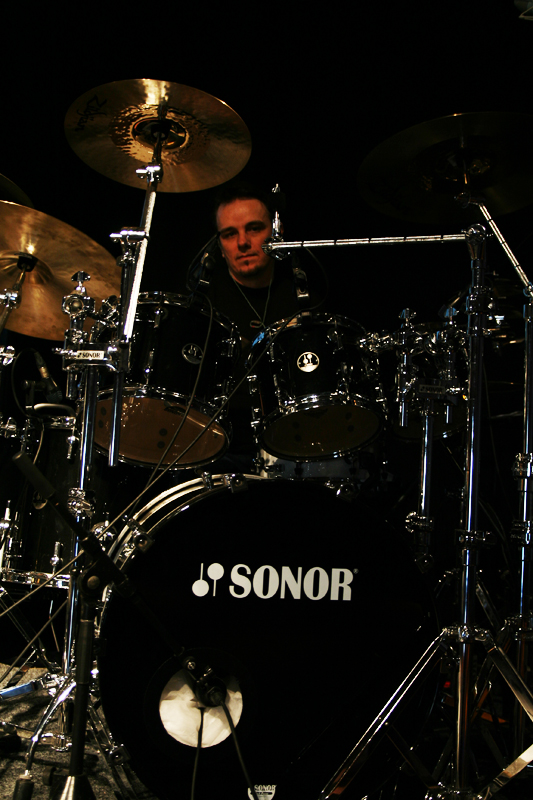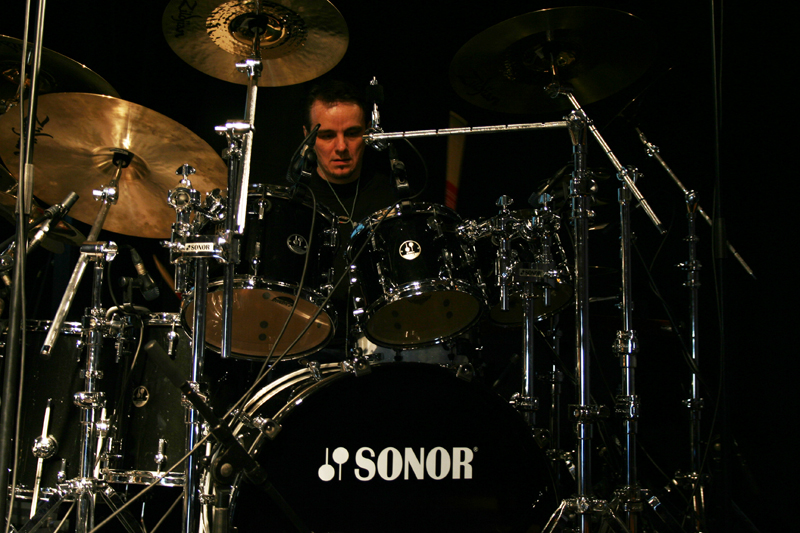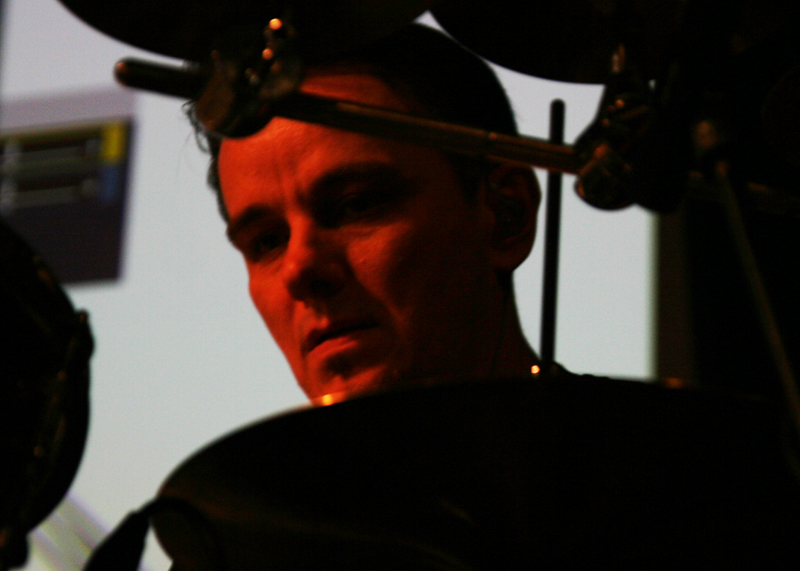Über Improvisation, Notenlesen und Anderes
Vor einiger Zeit hatte ich im Rockshop in Karlsruhe die Gelegenheit, dem Ausnahmedrummer von Porcupine Tree ein paar Fragen zu stellen. Das Interview hat großen Spaß gemacht, da Gavin nicht nur sehr sympathisch ist, sondern auch über eine gute Prise englischen Humor verfügt.
Vielen Dank an den Rockshop, Thomas Barth von Sonor und natürlich Gavin.
I was trying to begin the interview with Gavin as I noticed that my little digital-recorder didn't work.
At least I found out that the batteries were missing. That was a real professional start of the interview.

GH: I'm an old analog guy. You know what I mean? In analog I can trust. In digital recording there's always some insecurity. Sometimes we've recorded concerts and there's a terrible moment at the end of the concert where we stopped and forgot to save the stuff. All was lost. Another example: if you record with mini disc, you press "stop" and than you have to write "toc (table of content)" or all will be lost. I did an interview with a guy with a mini disc and then the power cable came out and everything was lost. I mean there is something on the disc but without a T.O.C it's useless and you can't hear it. Like a CD you have to finalize it. With digital there's always a state where you're not as confident as it used to be in the analog days. If the tape was going through the head, you could see the wheels going round and you were sure that it was recorded.
DF: Have you some analog machines in your studio?
GH: No and I have the same problem! Sometimes I use Logic on the Mac and I’m recording and playing the song and look at the computer. The wrong track was selected so I didn’t record on the drum tracks.
Of course we work differently with the digital equipment. Well, first there is the price. The analog multi track machines and tapes are really expensive. With Porcupine Tree we started recording “In Absentia” in New York on analog tape. We had only 15 minutes per tape (at 30 ips) and one tape costs around 300 Dollars. We bought 20 tapes, an incredible amount of money because we had the feeling that we should recorded the drums on tape.
We split the signal and recorded digitally onto logic, too. We compared the two recordings and the digital sounded so much better. We sent 19 tapes back and wasted one.
Sometimes you have what we call “looking through rose coloured glasses”. You have a romantic memory of working with analog tapes. But this time, it turned out wrong. The digital recording sounds better in every way.
DF: When and why did you start to play drums?
GH: I was six and I couldn’t really play the trumpet. My father was a professional trumpet player. So myself and my brothers all tried to play. But it’s so hard especially when you are very young. I didn’t have a connection to the trumpet. When I was six I was a good dancer and I could play football very well. In a way, I was coordinated and playing the drums was natural for me. To do different things with my arms and legs was not really a problem for me.
DF: And ten years later you started your professional career?
GH: Yes, three months before finishing the school I got an offer for a summer job. I had to play 20 weeks on the top of a bus. The bus was dressed in the colours of a bread company and we had to play Dixieland jazz. We drove across UK to supermarkets and played from 8:30 to 5:30 every day. I didn't really love Dixieland jazz so much but I was happy to finally be professional and earn money playing the drums.
DF: Later you played with Renaissance. How did you get the job?
GH: There was an advert in a music newspaper; I got an audition and it led to me joining the band. I think I got it because I could read music. I was able to listen to their songs and write them down. These songs were very long and complicated. So when I came to the audition with the charts. They said "where should we start?" I proposed to begin with the part in 11/4. They asked:"Where?" Like they didn't know what 11/4 was. They just played the songs without counting or writing them down. I don't know what the other drummers did who auditioned. The songs were really long, more than 20 minutes. There were a lot of time signature changes.
DF: Reading is an important skill?
GH: That showed me how important reading is. It's enough if you're able to write your own chart that you can play without mistakes and understand it. It also gave me a good chance to work quick and directly. I understood the mechanics of rhythm a bit better.
DF: Do you read a lot today?
GH: Not that much but without the skill of reading/writing I wouldn't have been able to write my books “Rhythmic Illusions” and “Rhythmic Perspectives”.

DF: How did you become a member of Porcupine Tree?
GH: I knew the keyboard player Richard Barbieri. We met us in the late 80's. We remained friends and worked together in other projects. When Chris Maitland left the band Richard called me up. He asked me if I could play as a session drummer for the recording of "In Absentia" in 2002. So I went to New York where we did the recording.
DF: : How did you prepare the session?
GH: I had one month to listen to the songs. I prepared some charts and some ideas how to play the songs.
DF: What's about improvisation while playing with Porcupine Tree?
GH: Well, that depends how you define improvisation. The arrangement is set because we use films and they need to be synchronised. We have to play with a click otherwise the film makes no sense. The guys in the band are not of a jazz background like I am. They don't have an improvisational mentality. When I started to play in this way they were very surprised, because their previous drummer always played the same fills. He played exactly like the record. Neil Peart of Rush does the same and that's absolutely fine – I have no problem with that at all – it's just a different approach. Some people like to go to a concert and hear the same drum fills as the record (they even 'air drum' to them) and want the same guitar solos.
I don't say, that's wrong, but it isn't my mentality. I don't necessarily think that my fills on the record are a part of the composition. Of course there are fills which I have to play and there are some that the band relies on. During the tour I might find some better fills and so I might play those instead. Some parts I improvise and they know that I improvise. But if I always play the same the whole tour with 120 shows I will go crazy.
DF: How do you create new songs with Porcupine Tree?
GH: Sometimes there is a drum machine on Steve's compositions, sometimes there is a jam and sometimes each member of the band writes his own stuff and gives it to the others. Every album we try a different method. It is nice that we don't stick to the same formula. To use different ways to create songs is a better way because you avoid routine. The songs are more creative. The worst thing is to just be repeatative.
DF: How is the relationship inside the band?
GH: We spend so much time on tour together that we don't see each other for months afterwards. Then when we next get together to write a new album I will be pleased to see them. To write good songs you need reflection of your life, but you need some life outside of being on tour. Sometimes you need to clear your mind.

DF: Should a drummer have to learn an melody instrument?
GH: Absolutely, especially the bass! You then get to understand what a bass player wants from a drummer. The answer is - just really good strong time. If the drummer can play complicated stuff in time that's also fine. Occasionally with some drummer friends of mine I get my bass and jam with them. Then I could get a feeling of the drummer's time from the perspective of being a bass player. I understood so much more. As a young drummer you often overplay and leave no room for the other instruments especially the bass. When you start to play - technique is everything and you want to know - how fast and how many notes can I play? To play very fast impresses you; but when you get older you realise that's kind of irrelevant and you start to learn about space and how people can sound good playing together.
DF: How can a young drummer learn this?
GH: The most important thing is to listen. Bad musicians only listen to themselves There's insecurity because they're still working on their technique while playing with others. It takes a lot of maturity and experience to change that.
While you're playing you have to know what you are doing and listen if it's the right way to support the song. Of course you can't think about your technique and worry about your grip. The grip has to be second nature to you because you have to listen and concentrate on the song.
DF: How do you create this right support of a song?
GH: Sometimes you have to think first and then play - and other times you feel really inspired. But it's random; if I could do it every night that would be great. I don't have the same energy every night. Sometimes it depends on the crowd. You know; sometimes we play very well and the crowd is boring. Sometimes the band doesn't play very well and the crowd is fantastic. That gives you so much energy and you start to enjoy it.
DF: What about personality?
GH: Your personality determines how you play. If you're a serious, shy, extroverted or even comedic person it would came out in your playing. I make a lot of decisions in every second how to play. Sometimes I play things only to make the band laugh; just for morale. I play a funny, very simple fill, look at them and they laugh. I know Richards favorite fill (the intro fill to David Bowie's “Young Americans”) and I play it random in every song during the tour. He always laughs at it. And sometimes he answers with a gliss down the piano.
DF: But you have to be secure in the band to do such jokes…
GH: Absolutely!
DF: Are you interested in the development of the drums and are you visiting fairs?
GH: Sometimes I see some interested stuff. Sometimes someone makes a new gadget so I buy and try it. The R.I.M.S. was a great idea and I like it how Sonor mounts the drums, because nothing touches the rim. I even don't like microphones on rims because the holders could change the drum sound. In a way people buy with their eyes and there is so much happen in the past decades. When you see how instruments are made and you understand why the price is sometimes high you develop respect for the people who design it.
Weitere Infos: www.gavharrison.com


